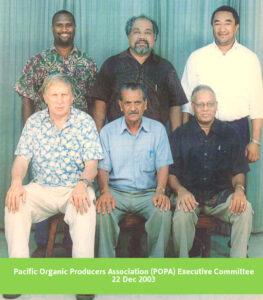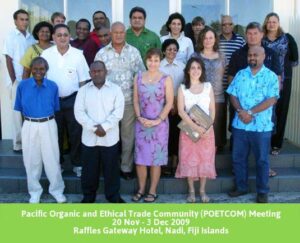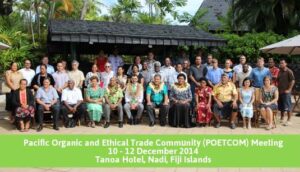 In the Pacific region, organic production is both traditional and new. It is traditional in the sense that the majority of producers to this day use tried and tested practices handed down from generation to generation that are generally in harmony with the environment and with modern organic principles.
In the Pacific region, organic production is both traditional and new. It is traditional in the sense that the majority of producers to this day use tried and tested practices handed down from generation to generation that are generally in harmony with the environment and with modern organic principles.
And it is new in that Pacific countries and territories are starting to understand the benefits of certification for obtaining access to external markets, and the need for research and training to develop the sector and generate much needed livelihoods for their people. As the organic movement around the world has developed and organized, so has the interest in further developing organic farming it the Pacific.
The 2nd Heads of Agriculture and Forestry Services Meeting in 2006 lent support to a request from the organics movement and asked SPC to seek support for the development of organic agriculture in the region.
The International Fund for Agricultural Development (IFAD) and the International Federation of Organic Agricultural Movement (IFOAM) provided support and the Pacific Regional Organics Task Force (ROTF) was established, which in turn, established the Pacific High Level Organics Group (PHLOG), a group of four of Pacific Island leaders led by the Hon. Prime Minister of Samoa to drive the initiative.
IFAD and IFOAM provided financial and technical assistance for developing the Pacific Organic Standard (POS), which was approved during the 2008 annual meeting of the Pacific Forum Islands leaders meeting in Niue, and launched two months later by the Samoa Prime Minister at the 2nd Regional Conference of the Ministers of Agriculture and Forestry in Apia, Samoa.
Further assistance was provided by IFAD and IFOAM for the development of the Pacific Regional Organic Strategic Plan, 2009-2013, work that has been completed and disseminated widely.
 In 2010 the first Participatory Guarantee System (PGS) using the POS was established in New Caledonia. The PGS known as “BioCaledonia” was licensed to use the “Organic Pasifika” certification marks and was the first step in developing a regional certification and organic guarantee scheme.
In 2010 the first Participatory Guarantee System (PGS) using the POS was established in New Caledonia. The PGS known as “BioCaledonia” was licensed to use the “Organic Pasifika” certification marks and was the first step in developing a regional certification and organic guarantee scheme.
Also highly significant in 2010 was the support received from the Heads Of Agriculture and Forestry Services(HOAFS) and the Committee of Representatives of Governments and Administrations(CGRA) who both endorsed the organic movements request for SPC to host the POETCom secretariat. This endorsement formalized SPCs relationship with POETCom and allowed SPC to provide ongoing support to the organic movement.
Through the European Union Funded Increasing Agricultural Commodities Trade (IACT) project the POETCom Secretariat was established in Suva in 2012 and the Advisory Board was elected during first the POETCom General Assembly hosted by the Government of French Polynesia with support of the French Pacific Fund and the EU IACT project in Papeete French Polynesia.
The United Nations Food and Agriculture Organization (FAO) has provided technical assistance in developing governance models and frameworks for the regional certification scheme and also in supporting the assessment of the POS for equivalence with other internationally recognized organic standards.
In 2013 the first series of POETCom organic training events was conducted with sub regional workshops in Vanuatu, and Tonga.
This organic training was supported by the United Nations Development Programme (UNDP) and focused on building capacity of young farmers and investing in the next generation of organic leaders.
2013 also saw the first POETCom Technical Exchange. The meeting held in Noumea New Caledonia was hosted by the Chamber of Agriculture and Government of New Caledonia with support from the French Pacific Fund, IFAD and the EU IACT Project.
 The Technical Exchange was conducted in order for organic producers and farmer support organizations to share information and help promote organic practices and responses to some of the unique challenges faced by farmers in the Pacific.
The Technical Exchange was conducted in order for organic producers and farmer support organizations to share information and help promote organic practices and responses to some of the unique challenges faced by farmers in the Pacific.
With assistance from IFAD 3 pilot projects were established to develop models for PGS appropriate for the very diverse situations in the Pacific Islands contributing the development of relevant certification for Pacific producers and opening new market opportunities.
By early 2014 POETCom had signed a Memorandum of Understanding with three internationally accredited certifying bodies to provide third party certification to the pacific organic standard (POS) allowing for the first time for Pacific producers to export product under our own organic standard.